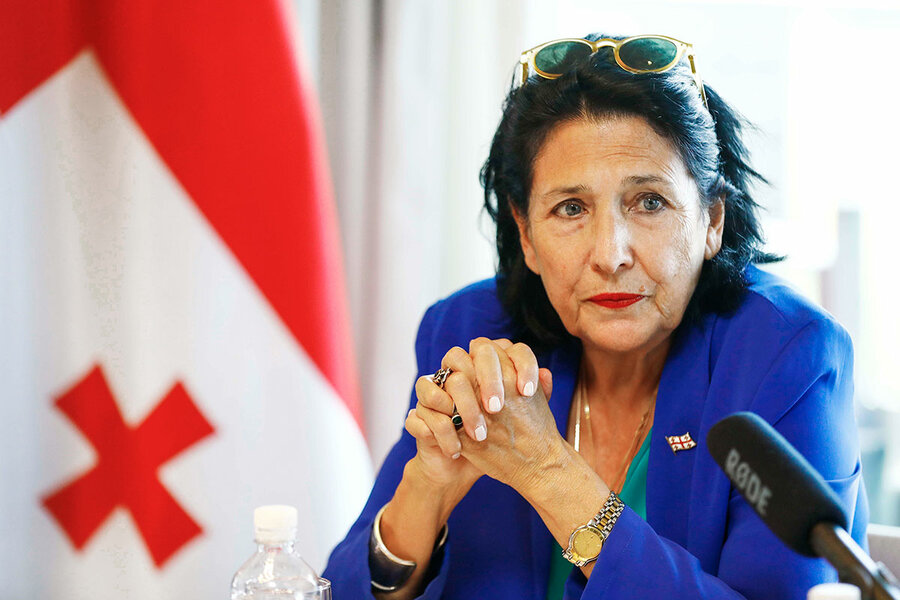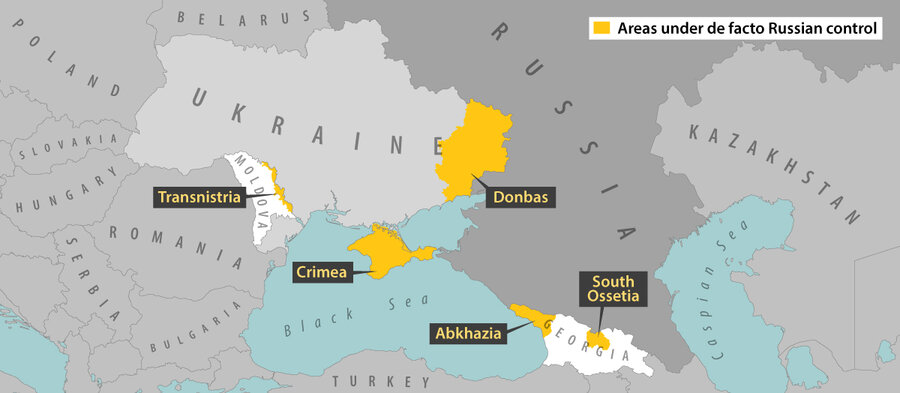‘A battle of nerves’: Georgia’s president on the Russian threat
Loading...
| Washington
Is the country of Georgia next in line for Russian aggression?
After all, like Ukraine, Georgia is a former Soviet republic that sits on Russia’s border and is not a member of NATO or the European Union. And also like Ukraine, before Russia’s February invasion, Georgia has long had portions of its territory under de facto Russian control.
Why We Wrote This
Salome Zourabichvili, the president of Georgia, recently joined the Monitor to discuss what she sees unfolding in Ukraine, and the wider implications for neighboring countries like hers.
Nevertheless, the question irks Salome Zourabichvili, president of Georgia.
“By talking all the time about the fact that ‘you’re next, you’re next,’ that might [plant] some ideas,” says President Zourabichvili, speaking Friday with several reporters at a coffee organized by The Christian Science Monitor. “Nobody’s next right now, because Russia is clearly showing that it needs all its forces on the main theater,” she adds, alluding to news reports that Russia’s offensive in eastern Ukraine is faltering.
Still, Ms. Zourabichvili, who came to Washington for the memorial service of former U.S. Secretary of State Madeleine Albright, wants to make sure policymakers know that Russia could target other countries.
“Nobody can see, what is the logic of the aggression started by the Russian leadership,” she says. “And when you don’t see the logic, you don’t know either what might be the day-after scenarios.”
Is the country of Georgia next in line for Russian aggression?
After all, like Ukraine, Georgia is a former Soviet republic that sits on Russia’s border and is not a member of NATO or the European Union. And also like Ukraine, before Russia’s February invasion, Georgia has long had portions of its territory under de facto Russian control.
Nevertheless, the question irks Salome Zourabichvili, president of Georgia.
Why We Wrote This
Salome Zourabichvili, the president of Georgia, recently joined the Monitor to discuss what she sees unfolding in Ukraine, and the wider implications for neighboring countries like hers.
“By talking all the time about the fact that ‘you’re next, you’re next,’ that might [plant] some ideas, even if those ideas do not exist,” says President Zourabichvili, speaking Friday with several reporters at a coffee organized by The Christian Science Monitor. “Nobody’s next right now, because Russia is clearly showing that it needs all its forces on the main theater,” she adds, alluding to news reports that Russia’s offensive in eastern Ukraine is faltering.
Still, Ms. Zourabichvili, who came to Washington for the memorial service of former U.S. Secretary of State Madeleine Albright, wants to make sure policymakers know that Russia could target other countries.
“Nobody can see, what is the logic of the aggression started by the Russian leadership,” she says. “And when you don’t see the logic, you don’t know either what might be the day-after scenarios.”
For the people of Georgia, a proud nation of 3.7 million nestled in the Caucasus Mountains to Russia’s south, memories of Russia’s invasion in 2008 are fresh. So, too, is the West’s muted response, now seen effectively as a green light for Russia to keep grabbing territory in its former empire.
The Georgian regions of Abkhazia and South Ossetia, first occupied in 2008 and representing one-fifth of Georgia’s territory, are still under Russian control. In Ukraine, the 2014 Russian annexation of Crimea and backing of separatists in the eastern Donbas added another expansionist toehold by Moscow.
Today the West remains in crisis mode over Russia’s most audacious post-Soviet move yet. On Friday, President Joe Biden asked Congress for a massive $33 billion package of military and humanitarian aid for Ukraine. The Georgian president applauded the proposal.
Ms. Zourabichvili is a compelling representative for her country, elected in 2018 as Georgia’s first female president. She does not run the government; that is the purview of the prime minister. But she has a bully pulpit, and she uses it.
One striking feature is her French accent. She was born and raised in France to a Georgian émigré family, and began her career as a French diplomat. In her 30s, she visited her parents’ homeland for the first time, and in 2004, was named foreign minister of Georgia. She has been involved in Georgian politics ever since, serving for a time in Parliament and as leader of The Way of Georgia party. She is now a political independent.
In our hourlong conversation, Ms. Zourabichvili spoke of the “fragility” of both her own country and another small former Soviet republic, Moldova (population 2.6 million), which sits on Ukraine’s southwest border. Last week, explosions rocked a long-Russian-occupied part of Moldova known as Transnistria. Ukraine described the attacks as Russian “false flag” operations that could be a pretext for mobilizing Russian troops there to attack southwestern Ukraine.
“It is what I’m calling a battle of nerves,” the Georgian president says.
Following are more excerpts from our discussion, lightly edited for clarity:
On how Moldova and Georgia, two small former Soviet republics, are handling their precarious positions:
Moldova and Georgia are the two countries that are not directly protected by NATO Article 5 [which guarantees mutual defense of members] or by being in the European Union. Those are the two countries that are obviously more fragile, I would say, and they are small countries with less resources.
We probably have more defense resources than Moldova, because we have been for many years intensely cooperating with NATO, reaching NATO’s standards [to qualify for membership], participating in Afghan missions.
Although that doesn’t mean we could do something of the kind that the Ukrainians have managed to do, because it’s a different country with different resources, whether human resources or military resources. The territory is completely different. And of course Georgia would not be able to have this type of long-term resistance, and it’s probably something that the Russians know very well.
Moldova is even more fragile. It has received very many [Ukrainian] refugees. We have something like 30,000, and they have more than 100,000, I think.
On what Georgia can do to protect itself:
Most important is not to be thinking whether we are the next in line [for Russian aggression], but to do everything that we can to be next in line for European integration.
Today there is almost unanimity, including countries very reluctant to a new enlargement [of European institutions that] are now looking at that a bit differently.
On whether Russia might follow through on threats to use nuclear weapons:
Looking at the past of [Russian President] Vladimir Putin, I think it’s more playing on the nerves than a real strategy to move up to, because that’s a suicidal strategy.
But we cannot plan on the fact that he would be very rational in his behavior. If he considers that everything is lost, then I don’t know how a person like that can react and what he can do. I don’t think that’s probable, but I don’t think that it’s something that we can completely exclude.
On why the Georgian government’s response to the Ukraine war has been more muted than that of Ms. Zourabichvili and the Georgian people:
Maybe I’m freer in my talk because I’m not really in charge of governing in a strict sense. And maybe it is better explained by the fact that yes, this country with occupied territories has to be careful in certain ways.
The people that are in the ruling party and that are governing today – the prime minister and the government, that are much younger than I am – it’s a very big responsibility to be leading a small country in these circumstances. And they might be balancing more on the side of caution than I am.










